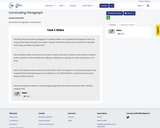
Conclusion Paragraphs and practice
- Subject:
- English
- Writing
- Material Type:
- Lesson Plan
- Author:
- Elizabeth Huggin
- Date Added:
- 01/03/2020

Conclusion Paragraphs and practice

The lessons included in the attached Google Slides incorporate standards from Computer Science, Math, Language Arts, and Physical Education. The lessons all focus on conditional statements (IF, THEN, ELSE) and can easily be adapted to fit any grade from kindergarten to fifth grade.

This video is part of the Continue to Know with WHRO TV series. Watch Chautauqua Hopson teach about the correct spelling of frequently used words.
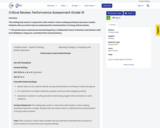
This writing task works in conjunction with student-choice reading workshop classroom models. Students will use mentor texts to understand the characteristics of strong critical reviews. ** This performance assessment was developed by a collaborative team of teachers and division staff from Middlesex, Poquoson, and West Point school divisions.

Each student writes a one paragraph summary of a chapter of a book and then illustrates their chapter. It can be used for a book the whole class is reading so then all of the summaries are collected and bound together to create a “summary book” of the book read. This activity can be used for both fiction and non-fiction books in any subject and any grade, although this activity is linked to upper primary SOLs. This activity assesses reading comprehension and practices all writing skills. It also includes Art SOLs, and if you have students create their final products on the computer, then you would be incorporating the Computer Technology SOLs as well. If it is used for a non-fiction text in a different content class, then the activity would also cover those SOLs. It can be used for EL classes in middle school also.

English Instructional Plan – Crowd-Sourcing Thesis Writing
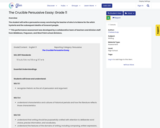
The student will write a persuasive essay convincing the teacher of who is to blame for the witch hysteria and the subsequent deaths of innocent people.** This performance assessment was developed by a collaborative team of teachers and division staff from Middlesex, Poquoson, and West Point school divisions.

Students choose a newsworthy article about something happening at the international, national, state, or local level. Students use the model below to set up a current event that includes summary, evidence, commentary, and citations.
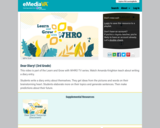
This video is part of the Learn and Grow with WHRO TV series. Watch Amanda Knighton teach about writing a diary entry.

This lesson expands upon the ideas of decomposition by using GameChangineer to incorporate commands to create a coded mini game from decomposing word problems. Students will assist the teacher in this guided lesson on how to create commands and use the website before engaing independently in Part 3. Activities are low prep with modifications included, but do require organized planning to implement effectively. If you have not done a lesson on decomposition, it is suggested you use Part 1 to help student's gain the necessary understandings of the processes used in this lesson.

This is the final part of an extended lesson on decomposition. Students will create a word problem to decompose and then use GameChangineer to create a mini game that is reflective of the word problem and its solution. Students will be using the plan, design, and review process thourhgout their creations. A rubric and self reflection tool for the final products are included. Activities are low prep with modifications included, but do require organized planning to implement effectively. If you have not done a lesson on decomposition, it is suggested you use Part 1 to help student's gain the necessary understandings of the processes used in this lesson. If you have not done a lesson on writing commands and using GameChangineer, it is suggested you use Part 2 before implementing this independent activity.

English Instructional Plan – Descriptive Writing for Grades K and 1

This lesson helps students realize the impact of writing with effective description.

English Instructional Plan-Developing Fluency 6-8

English Instructional Plan Developing Thesis Statements 6-8
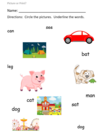
Students will discriminate pictures from writing.

Learn about inspirations for a story and how that story can inspire a new song. Mary and Mike travel to the Music Resource Center in Charlottesville to meet up with the author, Marc Boston, and the musician, Tevin White. Marc shares his beautiful children’s book, inspired by his own daughter. And Tevin shares a special song that he wrote, inspired by Marc’s book. Together, we learn how to stop carrying so much stuff!

English Instructional Plan- The Elements of an Effective Resume
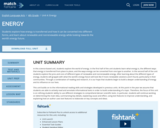
In this science-based unit, students explore the world of energy. In the first half of the unit students learn what energy is, the different ways that energy is transferred from place to place, and the ways energy can be converted from one type to another. In the second half of the unit students explore the pros and cons of different types of renewable and nonrenewable energy. After learning about the different types of energy, students will grapple with what the world's energy future will look like if more renewable solutions aren't found, particularly in their communities. Through a combination of reading and research, it is our hope that students begin to build a deeper understanding of energy and its influence on our lives.
This unit builds on to the informational reading skills and strategies developed in previous units. At this point in the year we assume that students are able to actively read and annotate informational texts in order to build understanding of a topic. Therefore, the focus of this unit is on refining students' ability to use different strategies to comprehend denser scientific texts. In particular, students will continue working on determining the main idea, summarizing key details, explaining cause and effect, using text features to improve understanding, and explaining how an author uses text features to elaborate on key concepts and ideas.
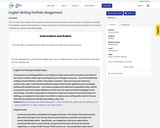
This is a long-term project that requires students to use essays they write for class to compile a portfolio. The portfolio requires the students to revise and review work they have already been graded on in order to continue to improve their writing skills.